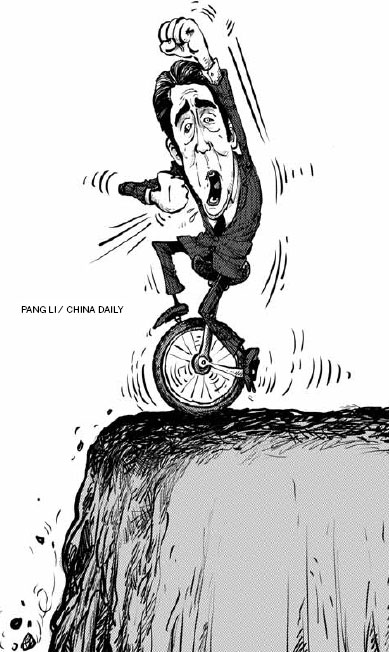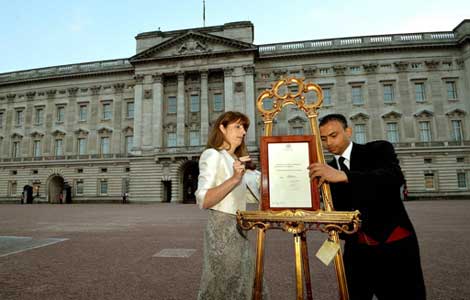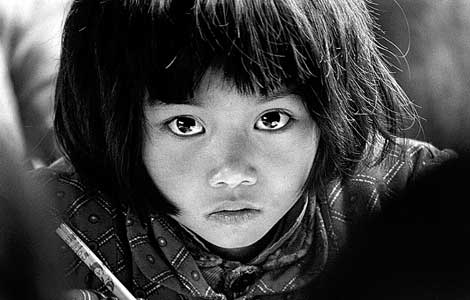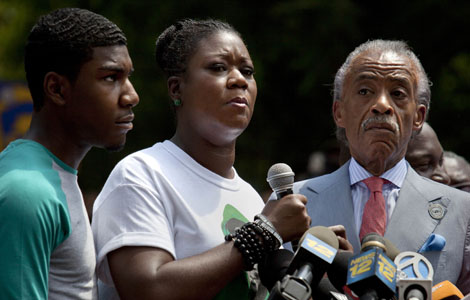Tough policy not to last long
Updated: 2013-07-23 07:31
By Yin Xiaoliang and Yang Xin (China Daily)
|
||||||||

Japanese Prime Minister Shinzo Abe's ruling coalition scored a decisive victory in the upper house election on Sunday. But he should not mistake the victory as Japanese people's approval for his hawkish foreign policy. Abe's victory can be attributed largely to the short-term effect of his economic policies, which some experts have named "Abenomics", and the lack of an appealing alternative to the Liberal Democratic Party.
Abe's understanding and ideology not only reflect his "indifference" and "ignorance" of history, but also highlight his "rightist" stance and intention of making Japan a military power again. Abe's statements and actions, from doubting the validity of the Tokyo Trials, challenging the post-World War II international order and regarding the atrocities committed by Japan's former militarists as "proud history" to exaggerating China's military threat and trying to revise the country's pacifist constitution in order to exercise the right to collective self-defense, show that he is dead set against China.
In the run up to the election, Abe got more belligerent, vowing not to concede even an inch to China in the Sino-Japanese dispute over the Diaoyu Islands. His was a politically pregnant move aimed at cashing in on Japan's overall right-leaning atmosphere to win the election.
Now, with a majority in both houses of Japan's bicameral parliament, Abe is expected to act tougher against China.
However, in the long run, Japan is highly unlikely to contain the rise of China. On the contrary, a series of domestic and international factors will limit Japan's aggressive moves and compel it to again adopt a cooperative and engaging approach toward China on the whole.
Two major domestic problems will prevent Japan from containing China's rise. Politics and the bureaucracy are the first. In a debate held at the Japan National Press Club sometime ago, eight other party leaders asked Abe to explain his economic policies, and give his views on revising Japan's constitution and ties with China. They also asked him to clarify his stance on Japan's wartime history.
In addition, Natsuo Yamaguchi, leader of the New Komeito Party, LDP's coalition partner, reminded Abe recently that he should give special consideration to Japan's relations with China when he draws up his schedule for Aug 15, the anniversary of Japan's surrender to the Allies in World War II. Analysts believe that Yamaguchi was dropping a hint that Abe should not visit the Yasukuni Shrine, which honors World War II criminals.
Although, on the whole, Japan seems to be moving to the right, there are still many pragmatic and far-sighted government officials and experts who are worried that Abe's remarks and actions aimed at whitewashing Japan's wartime atrocities will isolate Japan in Asia and invite countermeasures from China and other countries in the region, thus harming Japan's interests.
The second domestic problem Japan faces is the economy. To unite some Asian countries to contain China, Japan has to reward them with technical assistance and loans. But its sluggish economy and shrinking budget will prevent Abe from doing so.
On the international front, China and the United States are the main constraints for Abe in his quest to fulfill his rightist agenda. Since 2009, China has been Japan's largest trading partner and largest export market. But despite sharing the economic dividends brought about by China's economic development, Japan is determined to contain and delay China's peaceful rise.
Obviously, Abe's double standards will escalate tensions. After Japan announced that it was "nationalizing" the Diaoyu Islands, its political relations with China deteriorated, harming bilateral economic and trade relations in the process. If the Abe government continues to act tough, Japan's economic and trade relations with China will continue to suffer and thus deal a heavy blow to Abe's economic revival efforts.
Although Washington and Tokyo both believe that the US-Japan alliance is the cornerstone of security and stability in the Asia-Pacific region, the alliance is not between two equals. The US hopes Japan would play a more active role in furthering its strategic "pivot to Asia" policy to help maintain its dominance in East Asia. But at the same time, the US will prevent Japan from turning into a loose cannon.
Washington does not want to see the worsening of Sino-Japanese relations nor does it want to get into the quagmire of a Sino-Japanese conflict and harm its own interests. Therefore, the US will not let Abe's hard-line policy toward China to go unchecked. Japan's real intention is to enhance its global status by being a part of the US-led efforts to contain China's rise.
The other constraints Abe faces are ASEAN member states. Besides riding piggyback on the US to contain China, Abe also wants to draw ASEAN member states over to his side. But ASEAN member states only want certain economic and technical assistance and other practical benefits from their cooperation with Japan. They are not interested in ganging up with Japan to contain China, because they have been benefiting from China's rapid economic growth.
As some American scholars have said, in the short term, Abe will act tough on China, especially after winning the upper house election, by further glorifying Japan's militaristic past and denying there is a territorial dispute with Beijing. But considering the range of domestic and international constraints he faces - and to maintain political stability, realize the promised 4 percent yearly growth and lift the country out of years of deflation - Abe will have to return to cooperation and engagement with China.
The authors are researchers at the Institute of Japan Studies, Nankai University.
(China Daily USA 07/17/2013 page12)
Most Viewed
Editor's Picks

|

|

|

|

|

|
Today's Top News
Germany to probe spy services' ties with US
Snowden hopes to leave airport by Wednesday
Quake in NW China kills 89, injures 700
US blacks, whites split on Zimmerman verdict: poll
Kissinger and Jiang see bright future for relations
China sees no major forex withdrawal: regulator
Business holds up for Minmetals arm
Beijing knife attack leaves one dead
US Weekly

|

|














